A fireplace serves as the heart of any living room, creating a warm focal point that draws people together. Whether you’re renovating an existing hearth or installing something completely new, the right fireplace can dramatically transform your space from ordinary to extraordinary. From rustic stone surrounds to sleek modern designs, today’s fireplace options offer something for every style preference and budget.
In this guide, we’ll explore 15 inspiring fireplace ideas for living room spaces that combine beauty, functionality, and comfort. You’ll discover trending designs, practical placement tips, styling suggestions, and budget-friendly alternatives that will help you create the cozy retreat you’ve always wanted.
Statement Stone Fireplaces for Rustic Charm
Stone fireplaces bring an undeniable sense of permanence and natural beauty to any living room. Their textural elements create visual interest while their substantial presence anchors the entire space.
1. Stacked Stone Elegance
Stacked stone fireplaces feature individually placed stones that create a dimensional, textured look. This style works beautifully in mountain homes, farmhouses, or any space where you want to introduce natural elements. The irregular pattern of stacked stones creates a rustic yet sophisticated focal point that draws the eye immediately.
2. Limestone Sophistication
For a more refined take on stone, consider limestone surrounds. This elegant material offers a smoother finish while still maintaining natural character through subtle veining and color variations. Limestone pairs beautifully with both traditional and transitional décor, making it versatile for various living room styles.
3. River Rock Retreat
Round river rocks create a distinctly organic, cabin-like feel. This style works particularly well for corner fireplaces or hearths that extend outward into the room. The smooth, varied stones in shades of gray, tan, and brown bring the feeling of a streambed indoors, creating a nature-inspired sanctuary.
Designer Tip: When choosing stone for your fireplace, bring home samples and view them at different times of day. Natural light and evening lamp light can dramatically change how the colors and textures appear in your space.
Sleek Electric Fireplaces for Modern Homes
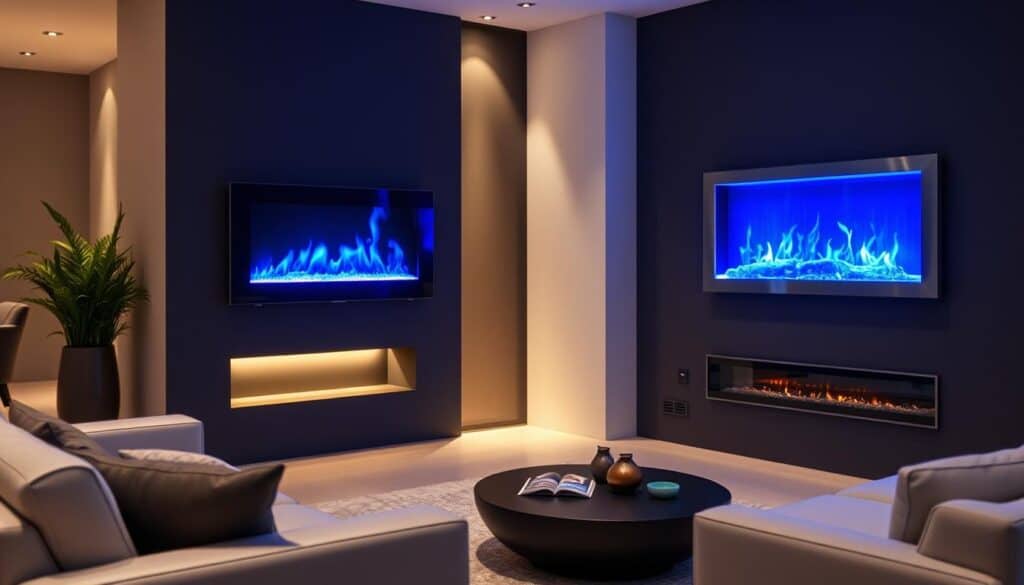
Electric fireplaces have evolved dramatically in recent years, offering sleek designs that complement modern living spaces while providing exceptional convenience and flexibility.
4. Wall-Mounted Linear Designs
Horizontal electric fireplaces create a dramatic, contemporary statement. These sleek units can be installed at any height on the wall, allowing for perfect viewing from your seating area. Many models feature customizable flame colors and brightness settings, letting you adjust the ambiance to match your mood.
5. Media Console Integration
For smaller living rooms, consider an electric fireplace built into a media console. This space-saving solution combines your TV stand and fireplace into one stylish unit. The lower profile works well in apartments or condos where wall modifications might be restricted.
6. Frameless Recessed Installation
For the ultimate in minimalist design, a frameless recessed electric fireplace creates a clean, architectural look. These units sit flush with the wall, appearing as a seamless part of your room’s design rather than an appliance. Surround the fireplace with tile, stone, or even wallpaper to create a custom look.
Electric Fireplace Advantages
- No venting, chimney, or gas line required
- Simple installation in almost any room
- Adjustable heat settings and flame effects
- No real combustion means no safety concerns about fumes
- Energy-efficient zone heating
Electric Fireplace Considerations
- Requires electrical outlet or direct wiring
- Heat output may be less than wood or gas options
- Flame effects, while improved, aren’t identical to real fire
- Dependent on electricity to function
Clean-Burning Bioethanol Fireplaces
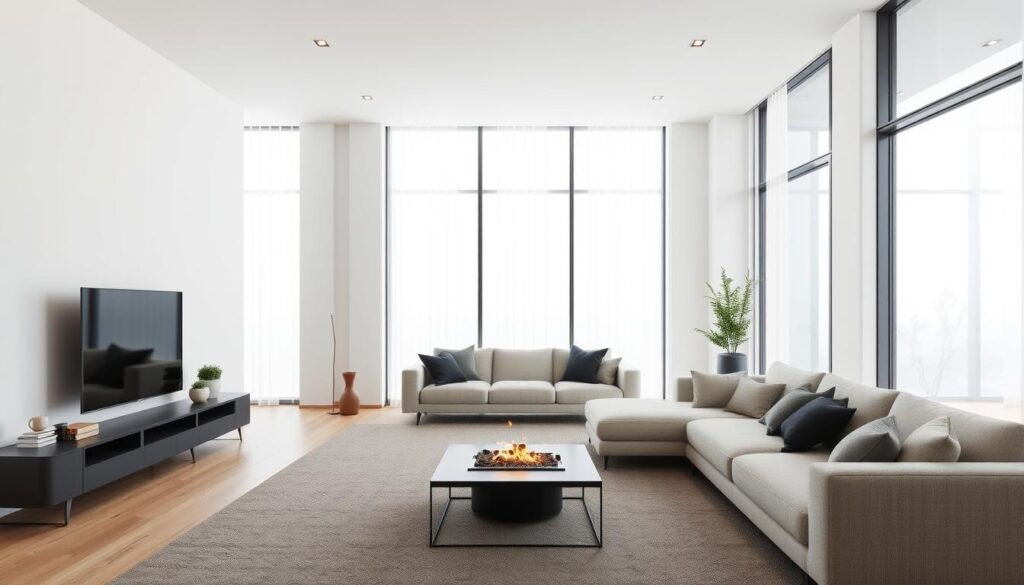
Bioethanol fireplaces offer the beauty of real flames without the need for a chimney or flue, making them perfect for apartments, condos, or homes where traditional venting isn’t possible.
7. Freestanding Fire Features
Portable bioethanol fireplaces can be positioned anywhere in your living room, creating a dynamic focal point that can be moved as needed. These sculptural pieces often feature contemporary designs that double as art objects even when not in use.
8. Tabletop Flame Accents
For a subtle touch of fire without a major installation, tabletop bioethanol burners create intimate ambiance. Place these compact units on coffee tables or side tables to bring the dancing flames closer to eye level while seated.
“Bioethanol fireplaces bridge the gap between traditional fire features and modern living requirements. They provide the sensory experience of real flames without the maintenance demands of wood-burning options.”
Traditional Wood-Burning Charm
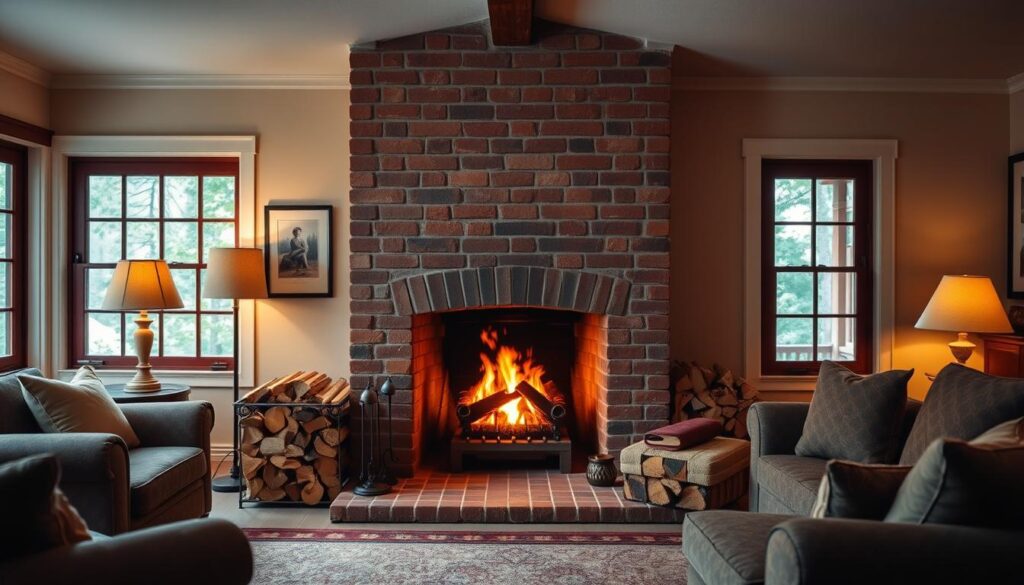
Nothing quite matches the authentic crackle, aroma, and ambiance of a wood-burning fireplace. These traditional hearths remain popular for their sensory experience and timeless appeal.
9. Brick Fireplace Makeovers
If your home has an existing brick fireplace that feels dated, consider a refresh rather than a replacement. Painting brick in crisp white creates a farmhouse feel, while dark charcoal or black creates dramatic contrast. For a more subtle update, try the German smear technique, which adds a whitewashed, time-worn patina.
10. Elevated Hearth Seating
A raised hearth extends your fireplace into the room, creating additional seating opportunities. Add cushions in fire-resistant fabrics to transform this area into a cozy spot for reading or conversation. The elevated design also makes tending to the fire more convenient.
Maintenance Reminder: Wood-burning fireplaces require regular chimney cleaning to prevent dangerous creosote buildup. Schedule professional inspections annually, ideally before the start of the cold season.
How to Style Your Mantel Year-Round
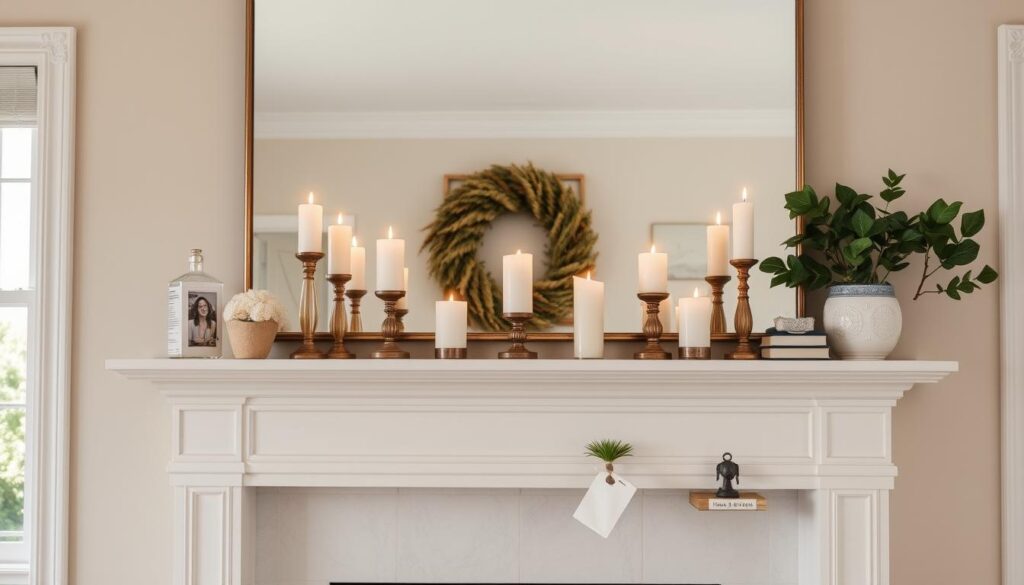
Your fireplace mantel offers prime real estate for displaying art, objects, and seasonal décor. The right styling approach can refresh your entire living room without major renovations.
11. Layered Art Arrangements
Create depth by layering artwork of different sizes. Start with a larger piece or mirror against the wall, then place smaller framed pieces or decorative objects in front. This approach adds visual interest while allowing you to showcase multiple pieces without overwhelming the space.
12. Asymmetrical Balance
Rather than perfectly mirroring items on each side of your mantel, try an asymmetrical arrangement. Place a taller object or plant on one side, balanced by a collection of smaller items on the other. This creates a more dynamic, collected-over-time look that feels less formal and more lived-in.
Spring/Summer Styling
- Fresh or preserved greenery
- Botanical prints
- Light-colored ceramics
- Glass vessels in sea blues
Fall Styling
- Dried wheat or pampas grass
- Vintage brass objects
- Amber glass containers
- Woven baskets
Winter Styling
- Pillar candles in varying heights
- Metallic accents
- Evergreen garlands
- Vintage book collections
Furniture Arrangement Around Your Fireplace
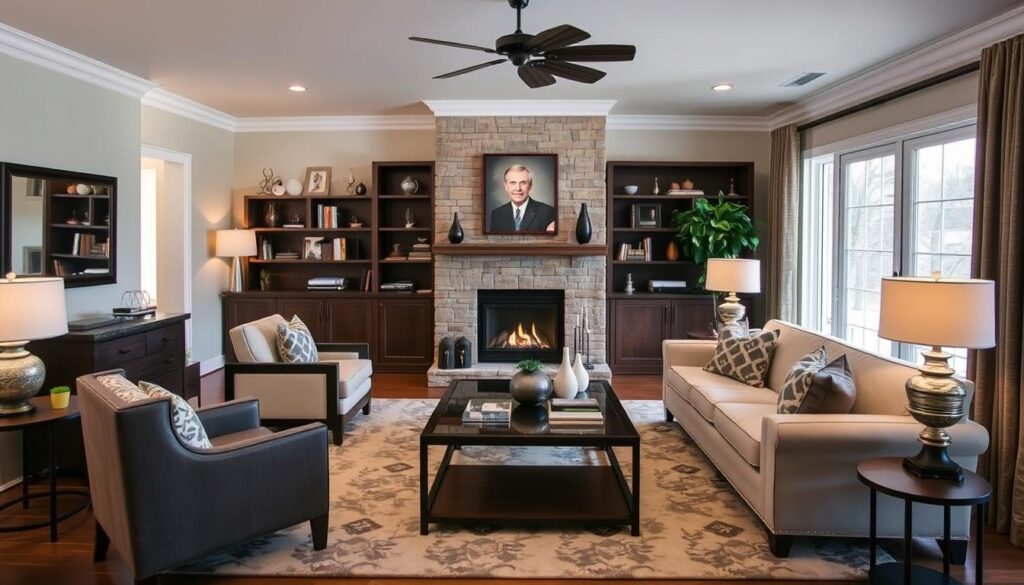
The way you position furniture around your fireplace significantly impacts both the functionality and feel of your living room. The right arrangement encourages conversation while highlighting your beautiful hearth.
13. Conversation-Focused Layout
Create an intimate seating area by placing sofas and chairs in a U-shape around the fireplace. This arrangement naturally encourages face-to-face interaction while keeping the fireplace as the room’s focal point. For larger spaces, float furniture away from walls to create a defined conversation zone.
14. Dual-Purpose Arrangements
In rooms where the TV and fireplace compete for attention, consider a flexible layout. Position seating at a 45-degree angle to both features, allowing views of the fire and the screen. Swivel chairs offer additional versatility, letting occupants turn toward the conversation or the entertainment as desired.
| Room Size | Recommended Furniture Distance | Arrangement Style |
| Small (under 200 sq ft) | 4-6 feet from fireplace | Intimate semicircle |
| Medium (200-300 sq ft) | 6-8 feet from fireplace | U-shaped conversation area |
| Large (over 300 sq ft) | 8-10 feet from fireplace | Multiple seating zones with fireplace as anchor |
Fireplace Alternatives for Renters and Small Spaces
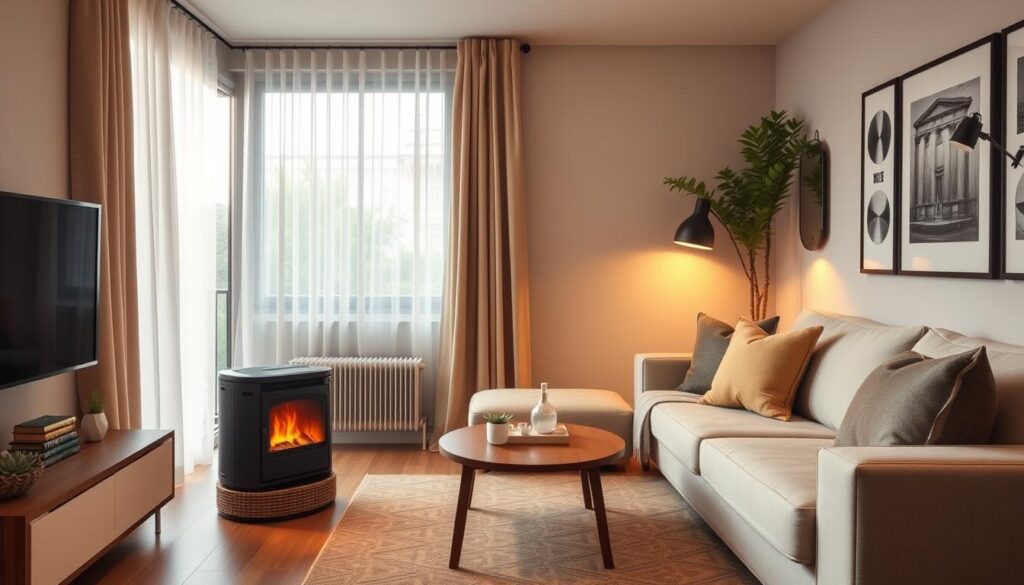
Don’t let rental restrictions or limited square footage prevent you from enjoying the cozy ambiance of a fireplace. These renter-friendly alternatives create warmth and visual interest without permanent modifications.
15. Faux Fireplace Surrounds
Create the architectural interest of a fireplace without the flame by installing a decorative surround and mantel against a wall. These can be freestanding pieces that don’t require attachment to the wall, making them perfect for rentals. Fill the opening with pillar candles, a decorative firewood stack, or even a small bookshelf for a functional twist.
DIY Faux Fireplace Materials
- Salvaged vintage mantels
- Prefabricated MDF surrounds
- Lightweight faux stone panels
- Peel-and-stick brick wallpaper
- Electric candle inserts for flameless ambiance
Placement Tips
- Center on the wall for traditional symmetry
- Position in corners to maximize floor space
- Create a media wall with TV mounted above
- Use as room divider in open-concept spaces
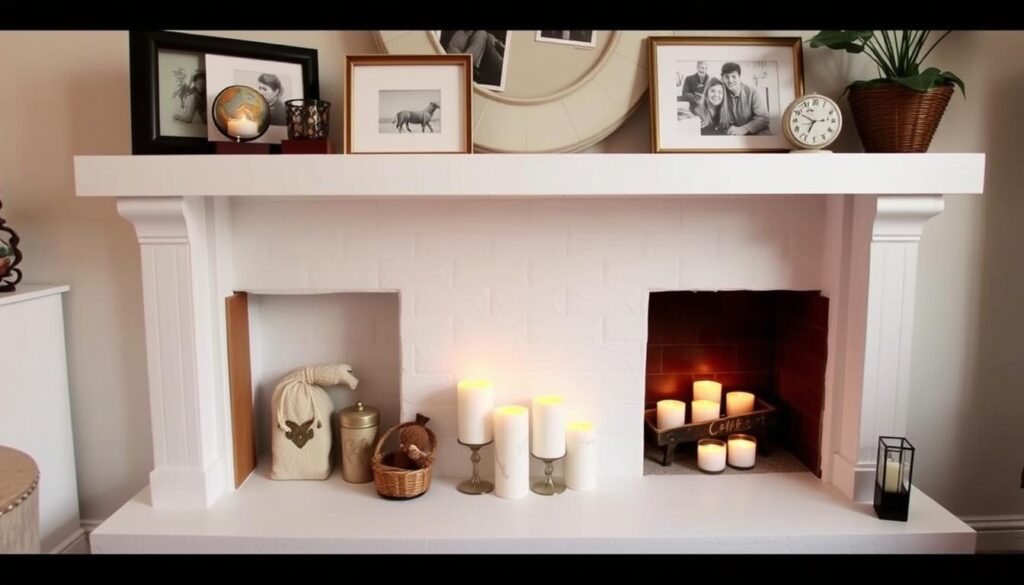
Safety First: Essential Fireplace Precautions

While fireplaces add warmth and beauty to your living room, they also require proper safety considerations to protect your family and home.
Clearance Requirements
Maintain adequate space between your fireplace and combustible materials. For wood-burning fireplaces, keep furniture, drapes, and decorative items at least 3 feet away from the hearth. Wall-mounted TVs should be positioned at least 12 inches above a mantel, which itself should be at least 12 inches above the firebox.
Childproofing Measures
If you have young children or pets, a sturdy fireplace screen is essential. Choose a model that fully covers the opening and won’t tip over easily. For added protection, consider a hearth gate that creates a barrier around the entire fireplace area, keeping curious little ones at a safe distance.
Important Safety Reminder: Install carbon monoxide detectors on every level of your home and near sleeping areas if you have any type of combustion fireplace (wood, gas, or bioethanol). Test these devices monthly and replace batteries annually.
Wood-Burning Safety
- Use a spark guard screen at all times
- Never leave a fire unattended
- Install a chimney cap to prevent wildlife entry
- Schedule annual chimney inspections and cleaning
- Burn only seasoned hardwood (never pine or treated wood)
Gas Fireplace Safety
- Install a safety screen to prevent burns
- Have gas lines professionally inspected annually
- Keep remote controls and switches away from children
- Know how to shut off the gas supply in an emergency
- Ensure proper venting is maintained
Maintenance Best Practices

Regular maintenance keeps your fireplace looking beautiful while ensuring it functions safely and efficiently. Different fireplace types have specific care requirements.
Wood-Burning Fireplace Maintenance
Beyond annual professional chimney sweeping, clean ash from the firebox once it reaches 1 inch in depth. Leave a thin layer of ash when the fireplace is in regular use, as this helps insulate the fire. Clean fireplace doors with a specialized glass cleaner designed to remove creosote buildup.
Gas Fireplace Care
Have gas lines and connections inspected annually by a certified technician. Clean decorative logs according to manufacturer instructions, typically using a soft brush to remove dust. Avoid moving decorative elements, as their precise placement is important for proper flame pattern and safety.
Electric and Bioethanol Upkeep
For electric fireplaces, regularly dust the interior and exterior surfaces. Check that vents remain unobstructed. With bioethanol models, wipe spills immediately and clean burners according to manufacturer guidelines. Always allow these units to cool completely before cleaning.
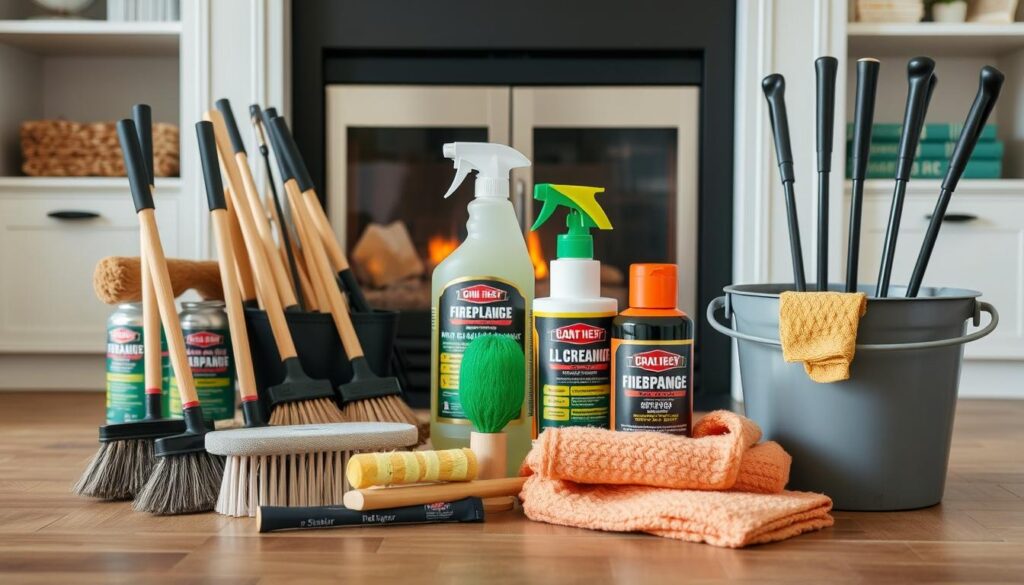
Transform Your Living Room with the Perfect Fireplace
Whether you opt for the rustic charm of a stone hearth, the convenience of an electric model, or the architectural interest of a faux fireplace, this central feature has the power to completely transform your living room. By carefully considering design, placement, safety, and maintenance, you’ll create a warm, inviting space that becomes the heart of your home.
Remember that even small changes—like updating your mantel styling or rearranging furniture—can refresh your fireplace area without major renovations. The most important element is creating a space that feels welcoming and comfortable for you and your guests.
Share Your Fireplace Transformation
Have you recently updated your living room fireplace? We’d love to see your before-and-after photos and hear about your experience. Share your fireplace transformation on social media with #CozyFireplaceReveal or leave a comment below with your favorite idea from this article.
How much does it typically cost to install a new fireplace?
Installation costs vary widely depending on the type of fireplace. Electric fireplaces are the most affordable, ranging from $400-$2,000 installed. Gas fireplaces typically cost $3,000-$7,500 including installation. Traditional wood-burning fireplaces are the most expensive, often ranging from $8,000-$15,000 or more if a chimney needs to be built. Always get multiple quotes from licensed professionals for your specific situation.
Can I install a fireplace in a home that doesn’t have one?
Yes! Homes without existing fireplaces have several options. Electric fireplaces require only an electrical outlet and can be installed almost anywhere. Ventless gas fireplaces need a gas line but no chimney. Bioethanol fireplaces need no special venting. If you want a traditional wood-burning fireplace, you’ll need to add a chimney, which is a more extensive renovation but still possible in most homes.
What’s the most energy-efficient type of fireplace?
Electric fireplaces are generally the most energy-efficient option, as they convert nearly 100% of their energy into heat and allow for precise temperature control. High-efficiency gas fireplaces with sealed combustion systems are the next most efficient. Traditional wood-burning fireplaces are typically the least efficient, as much of their heat escapes up the chimney, though adding glass doors and a heat exchanger can improve efficiency.

